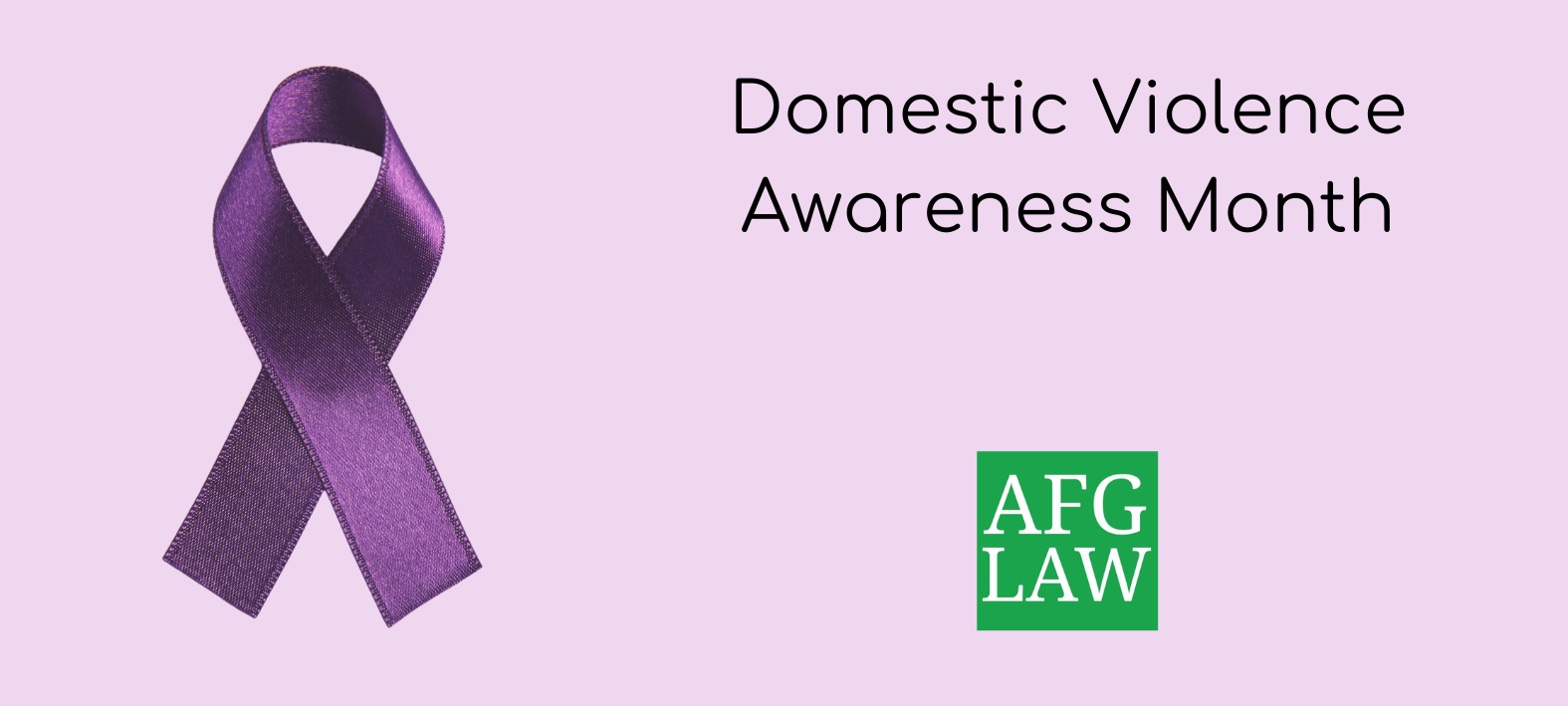October is Domestic Violence Awareness Month and is a month dedicated to uniting advocates, organisations and individuals across the UK in their effort to end domestic violence.
Domestic violence can be complex and impacts on women, children and men alike. It can often be understood as pattern of behaviours used to keep control over a partner and can manifest in many different ways.
Domestic abuse can include, but it is not limited to:
- Physical abuse
- Emotional abuse
- Financial control
- Controlling and coercive behaviour
- Psychological abuse
The Family team at AFG LAW address some of the most common forms of domestic violence – and how to spot them.
Physical abuse
Physical abuse is perhaps the most easily identifiable, using acts of violence to hold control over a partner. Signs to look for in a relationship where you suspect physical abuse may be taking place include:
- Physical marks such as cuts, scratches or bruises
- Unusual covering up – a person may attempt to hide signs by wearing heavy clothing on a very hot day, heavier makeup that usual or sunglasses when they are not really needed.
- A nervous disposition and the inability to maintain eye contact during a conversation with you
Emotional abuse
This can take many different forms and can include:
- Belittling and or putting down
- Blame for the abuse or arguments
- Denying that abuse is happening
- Isolation from family and friends
- Preventing going to college or work
- Making unreasonable demands for attention
- Accusations of flirting or having affairs
- Controlling what to wear, who to see, where to go, and what to think
(Source: www.gov.uk)
Emotional abuse may be subtle, and often the victim may not even be aware of it for quite some time. This is because it does not always consist of shouting and swearing – indeed, it can sometimes be carried out through silence.
You may realise that someone is suffering from emotional abuse through changes in their behaviour. Do you have a friend who is suddenly reluctant to go out as much? Maybe they have changed their appearance? Or perhaps they have become very defensive of their partner’s behaviour which as an outsider, you may recognise as controlling.
Financial abuse
Financial (economic) abuse is a recognised form of domestic abuse defined in the Domestic Abuse Act.
- Sabotaging income and access to money -for example preventing the partner from having employment, taking their pay and refusing access to a bank account
- Restricting how money is spent as well as how possessions are used – for example checking bank accounts and controlling use of mobile phones and cars
- Exploiting a partner’s economic situation – for example, misuse of money in joint accounts and building up debt in a partner’s name
There are several things to look out for if you think someone you know is suffering financial abuse. They may suddenly have an unexplained lack of money and be unable to do the things they usually do. For example, they may “forget” their purse when you go out together. There could be a change in their job, when they previously have said how much they enjoyed it. They may suddenly seem anxious about buying the basics such as food and petrol and their appearance may change – no haircuts, ill-fitting clothing or not being properly dressed for the weather.
How to support a friend of family member
If you suspect a friend or family member is suffering from abuse, it can be hard to know what to do. Gently open the communication path – but understand that they might not be ready to talk.
If someone confides in you that they’re suffering domestic abuse:
- listen, and take care not to blame them
- acknowledge it takes strength to talk to someone about experiencing abuse
- give them time to talk, but don’t push them to talk if they don’t want to
- acknowledge they’re in a frightening and difficult situation
- tell them nobody deserves to be threatened or beaten, despite what the abuser has said
- support them as a friend – encourage them to express their feelings, and allow them to make their own decisions
- don’t tell them to leave the relationship if they’re not ready – that’s their decision
- ask if they have suffered physical harm – if so, offer to go with them to a hospital or GP
- help them report the assault to the police if they choose to
- be ready to provide information on organisations LINK that offer help for people experiencing domestic abuse
If you are worried that a friend, neighbour or loved one is a victim of domestic abuse then you can call the National Domestic Abuse Helpline for free and confidential advice, 24 hours a day on 0808 2000 247.
If you believe there is an immediate risk of harm to someone, or it is an emergency, you should always call 999. Source: www.gov.uk
How AFG LAW can help
If you are suffering from domestic abuse, please do not suffer in silence. Help is available for anyone who is suffering abuse at home, from family or within relationships. We can assist by offering a free consultation, in which a solicitor will contact you to discuss your circumstances to advise whether there is merit in making an application to the Court for a Non-Molestation Order, which can protect you and any associated children from abuse or harassment.
Our Non-Molestation Order guide linked below provides more information about who can apply and how the order could protect you.
What is a Non-Molestation Order? – AFG Law
Legal Aid can be available to support you in making an application for a Non-Molestation Order, subject to a means test. Within our free consultation, we can also discuss eligibility for Legal Aid.
Get in Touch
Please contact us on familysolicitor@afglaw.co.uk or 01204 377600 for further information or assistance.
